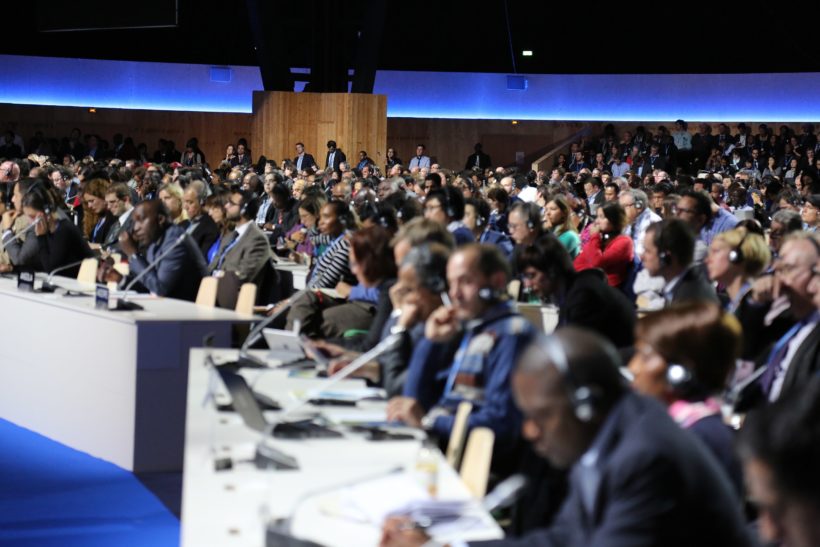
By Trish O’Beirne
Having spent most of my academic career in the happy company of students finding creative solutions to the climate crisis, the reality of negotiations at the United Nations Framework Convention on Climate Change (UNFCCC) Climate Change Conference in Bonn this summer came as a shock. I had been convinced that working on an international stage was where I could make the biggest difference tackling climate change. But that bubble has been burst.
Stalemate in Bonn
The conference in Bonn, a precursor to the Conference of the Parties (COP25) in Chile at the end of the year, aimed to set the stage for raising ambition and solidifying climate plans and policies before the upcoming COP25. However, after 14 days of negotiations, there was no movement on some of the key articles that were agreed upon almost four years ago in Paris. The delay in implementing these articles, or even understanding how they will be implemented, is disheartening. It results in a loss of momentum, a loss of financial opportunity, and a loss in the most vital resource of all – time.
Points of contention that were meant to be resolved in Bonn, such as the reaction to the IPCC’s Special Report on 1.5°C and the rules of carbon markets within Article 6, remain unsolved – and will be debated again at length in Santiago. Trying to reconcile the conflicting interests of oil-based economies and the calls for ambitious action is proving an impossible task. The lack of progress in resolving these key debates left me disillusioned at the ability of international governance to enhance ambition.
The pros and cons of keeping it vague
Flexibility is at the cornerstone of international law. The Paris Agreement set an overarching target to limit average global temperature rise to 2°C above pre-industrial levels, but it is up to individual countries to decide exactly how they will achieve their own targets. Flexibility guarantees more countries remain signatories and are active in the discussion, and they can decide for themselves how they want to reduce their emissions based on their own social and economic climate. But this vagueness isn’t really bringing the progress intended.
For one, there is ambiguity about whether the ultimate target of the Paris Agreement itself can be achieved. This is seen in the United Nations Environment Programme’s Emissions Gap Report, which indicates the inadequacy of countries current commitments to reduce emissions under the Paris Agreement. In addition, we are uncertain about how our planet will react to different levels of warming, with events such as permafrost and ice cap melting potentially having irreversible implications. This adds yet more uncertainty to vague, flexible and, at this stage, frankly unagreeable agreements. How can we prepare ourselves for COP25 to ensure a successful and progressive outcome?

The eleventh meeting of the research dialogue Science for Transformation at the Chamber Hall at the UN Climate Conference in Bonn (c) UNclimatechange
Looking through a local lens
Being at the heart of the international arena in Bonn didn’t give me the hope I wanted, but refocusing my attention to a national, even local, level has. On the streets, there is a new kind of climate enthusiasm. This call for ambitious action on climate change is coming from kids, local communities and cities. And these messages are being heard by those in power. In June, the UK set a target to reach net zero emissions by 2050, joining Denmark, France, Ireland, Norway, Sweden, Portugal, Uruguay and California who all have similar targets. There is also strong ambition among EU member states to set a bloc-wide target. The ambition is not being driven from the top but rising up from the bottom.
Moving forwards to Chile
This ambition and energy at local and national level needs to be harnessed and channeled into future negotiations at COP25. Movements from the bottom up have led to some of the most ambitious climate targets so far, in some of the most industrialised countries, such as the UK. Let’s trust this emerging power, harness it and promote at COP25. The Talanoa Dialogue, introduced at COP24 in 2017 to reflect a process of inclusive, participatory and transparent dialogue, was a step in the right direction, but let’s push it further. By empowering local communities and governments, we can push for more bottom up actions.
The issues discussed in Chile also need to be talked about beyond just academic and environmental circles. Just look at the impact of people like Greta Thunberg and Alexandria Ocasio-Cortez when it comes to getting media coverage of important climate issues. Similarly, broadcasters are trying to make climate change issues more tangible with programmes like the BBC’s Climate Change – the Facts, and the ITV’s new series Earth on the Edge. Bringing the messages of climate action into our sitting rooms is a vital step in the right direction.
My hope was not lost at Bonn, rather it was reignited. Perhaps the voice of the people can have more influence and momentum than the voices of 198 bureaucrats.
Editor’s note: this article originally appeared on Imperial College London’s Grantham Institute for Climate Change blog
Trish O’Beirne is a student on the MSc in Environmental Technology Global Environmental Change and Policy (GECP option. Trish recently attended the UNFCCC’s Climate Change Conference in Bonn.



Leave a Reply